

Rigorous Reasoning, Reflexive Research and the Space for ‘Alternative Archaeologies’. Questions for Maritime Archaeological Heritage Management. - Ransley - 2007 - International Journal of Nautical Archaeology. Abstract As England's heritage policy is shaped around us, it is vital that there is debate, and some consensus, among the maritime archaeological community on core management questions.
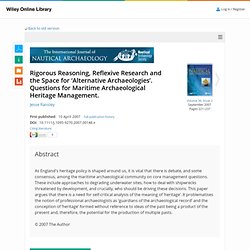
These include approaches to degrading underwater sites, how to deal with shipwrecks threatened by development, and crucially, who should be driving these decisions. Archaeology anthropology aberrant cycladic. ABERRANT __ Deviation from the class to which an artifact or phenomenon belongs.

ABORIGINAL. INDIGENOUS __ Pertaining to the original occupants of a given region. ABRASIVE STONE __ Usually a sandstone slab used for grinding and polishing. ABSOLUTE DATING __ A dating method that determines an object's exact age, as opposed to its relative age; includes such techniques as dendrochronology and radiocarbon dating. ABU SIMBEL __ Two temples located close to the border between Sudan and Egypt.
ACCLIMATORY ADJUSTMENTS __ Reversible physiological adjustments to stressful environments. ACCRETION __ Growth by virtue of an increase in inter-cellular materials. ACCULTURATION __ The process by which a culture absorbs the traits or customs of another culture with which it is in direct contact. ACEPHALOUS SOCIETY __ A society without a political head such as a president, chief, or king. ACHEMENID EMPIRE __ Persian empire named after its founder Achemens. Underwater Archaeology: The NAS Guide to Principles and Practice. Antiquarian. This article is about practitioners of the scholarly pursuit of antiquarianism.

For the trade in old books, see Bookselling. For trading or collecting old objects, see Antique. Today the term is often used in a pejorative sense, to refer to an excessively narrow focus on factual historical trivia, to the exclusion of a sense of historical context or process. History[edit] Antiquarianism in ancient China[edit] During the Song Dynasty (960–1279), the scholar Ouyang Xiu (1007–1072) analyzed alleged ancient artifacts bearing archaic inscriptions in bronze and stone, which he preserved in a collection of some 400 rubbings;[1] Patricia Ebrey writes that he pioneered early ideas in epigraphy.[2] Interests in antiquarian studies of ancient inscriptions and artifacts waned after the Song Dynasty, but were revived by early Qing Dynasty (1644–1912) scholars such as Gu Yanwu (1613–1682) and Yan Ruoju (1636–1704).[3]
Epistemology. 1.
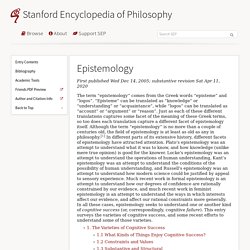
The Varieties of Cognitive Success There are many different kinds of cognitive success, and they differ from one another along various dimensions. Exactly what these various kinds of success are, and how they differ from each other, and how they are explanatorily related to each other, and how they can be achieved or obstructed, are all matters of controversy. This section provides some background to these various controversies. 1.1 What Kinds of Thing Enjoy Cognitive Success? Typology (archaeology)
Typology is based on a view of the world familiar from Plato's metaphysics called essentialism.
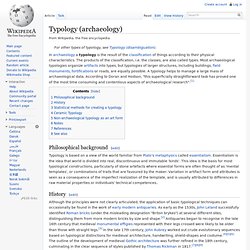
Essentialism is the idea that world is divided into real, discontinuous and immutable ‘kinds’. This idea is the basis for most typological constructions, particularly of stone artefacts where essential forms are often thought of as ‘mental templates’, or combinations of traits that are favoured by the maker. Variation in artifact form and attributes is seen as a consequence of the imperfect realization of the template, and is usually attributed to differences in raw material properties or individuals' technical competences.. In the 19th and early 20th centuries archaeological typologies continued to be constructed using a combination of empirical observation and intuition. For cultures that produced pottery, archaeologists invariably spend a great deal of time defining ceramic "types.
" The names assigned to the ceramic types are arbitrary. Jump up ^ Doran, J.E.; Hodson, F.R. (1975). Cultural history. The term cultural history refers both to an academic discipline and to its subject matter.
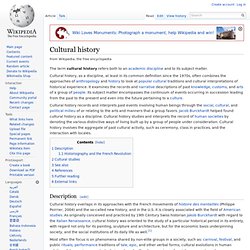
Cultural history records and interprets past events involving human beings through the social, cultural, and political milieu of or relating to the arts and manners that a group favors. Jacob Burckhardt helped found cultural history as a discipline. Marxism.
Marxism is a worldview and a method of societal analysis that focuses on class relations and societal conflict, that uses a materialist interpretation of historical development, and a dialectical view of social transformation.
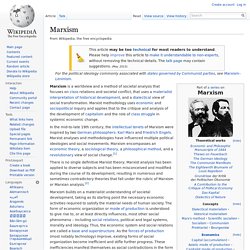
Marxist methodology uses economic and sociopolitical inquiry and applies that to the critique and analysis of the development of capitalism and the role of class struggle in systemic economic change. In the mid-to-late 19th century, the intellectual tenets of Marxism were inspired by two German philosophers: Karl Marx and Friedrich Engels. Marxist analyses and methodologies have influenced multiple political ideologies and social movements. Marxism encompasses an economic theory, a sociological theory, a philosophical method, and a revolutionary view of social change.[1] Marxism builds on a materialist understanding of societal development, taking as its starting point the necessary economic activities required to satisfy the material needs of human society.
V. Processual archaeology. Proponents of this new phase in archaeology claimed that with the rigorous use of the scientific method it was possible to get past the limits of the archaeological record and learn something about how the people who used the artifacts lived.
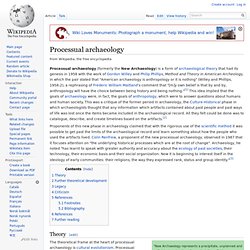
Systems theory in archaeology. Systems theory in archaeology is the application of systems theory and systems thinking in archaeology.

It originated with the work of Ludwig von Bertalanffy in the 1950s, and is introduced in archaeology in the 1960s with the work of Sally R. Binford & Lewis Binford's "New Perspectives in Archaeology" and Kent V. Flannery's "Archaeological Systems Theory and Early Mesoamerica". Overview[edit] Bertalanffy attempted to construct a general systems theory that would explain the interactions of different variables in a variety of systems, no matter what those variables actually represented. At the time Binford thought the Middle Range Theory may be as far as archaeologists could ever go, but in the mid-1970s some believed that Systems Theory offered the definitive Upper Range Theory. Criticism[edit] Unfortunately archaeologists found it was rarely possible to use Systems Theory in a rigorously mathematical way. Relativism. Forms of relativism[edit] Anthropological versus philosophical relativism[edit] Anthropological relativism refers to a methodological stance, in which the researcher suspends (or brackets) his or her own cultural biases while attempting to understand beliefs and behaviors in their local contexts.
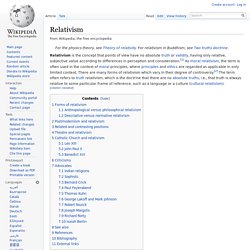
Ethnoarchaeology. Ethnography. Ethnography (from Greek ἔθνος ethnos "folk, people, nation" and γράφω grapho "I write") is the systematic study of people and cultures. What is Anthropology? Anthropology is the study of humans, past and present. To understand the full sweep and complexity of cultures across all of human history, anthropology draws and builds upon knowledge from the social and biological sciences as well as the humanities and physical sciences. A central concern of anthropologists is the application of knowledge to the solution of human problems. Historically, anthropologists in the United States have been trained in one of four areas: sociocultural anthropology, biological/physical anthropology, archaeology, and linguistics.
Post-processual archaeology. In the United States, archaeologists widely see post-processualism as an accompaniment to the processual movement, while in the United Kingdom, they remain largely thought of as separate and opposing theoretical movements. In other parts of the world, post-processualism has made less of an impact on archaeological thought.[4] Various archaeologists have criticized post-processual archaeology, for a variety of reasons. Approach to archaeology[edit] Subjectivism[edit] Interpretation[edit] Understanding past societies[edit]
Theory.org.uk trading cards. Underwater archaeology - Topic. Maritime Archaeology - The development of a discipline. History of underwater archaeology. People have probably always loved history. Already Herodotus, the Greek historian, was fascinated by past civilizations. The ancient Greek and Romans also believed in a Golden Age in times past, when everything supposedly hade been much better. During the Middle Ages in Europe, this belief continued, letting ancient Rome and Greece represent that lost Golden Age. What is Maritime Archaeology? - Australian Institute for Maritime Archeology.